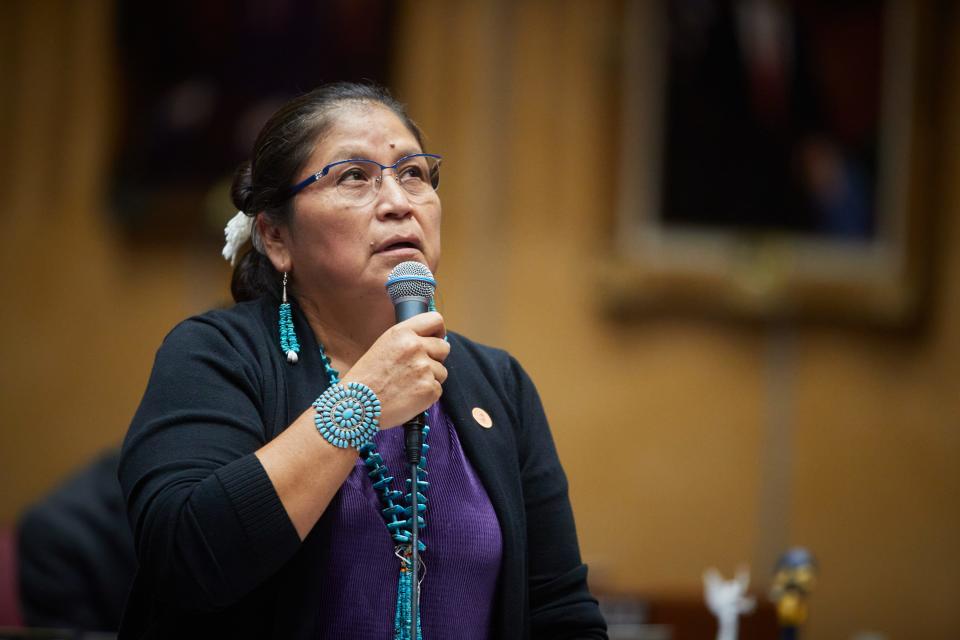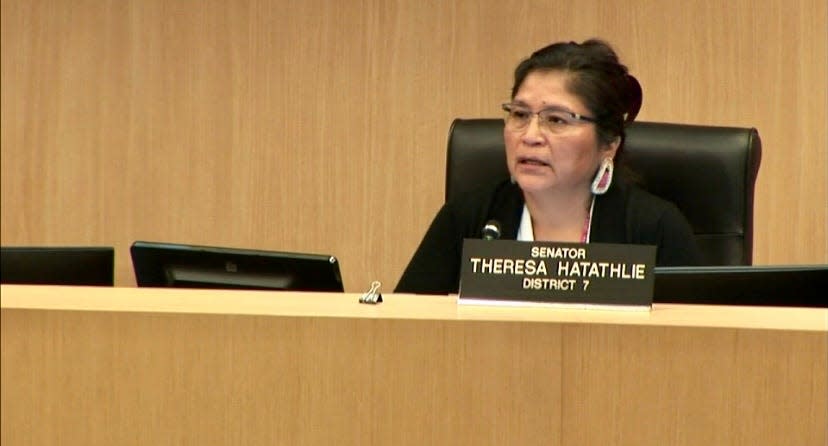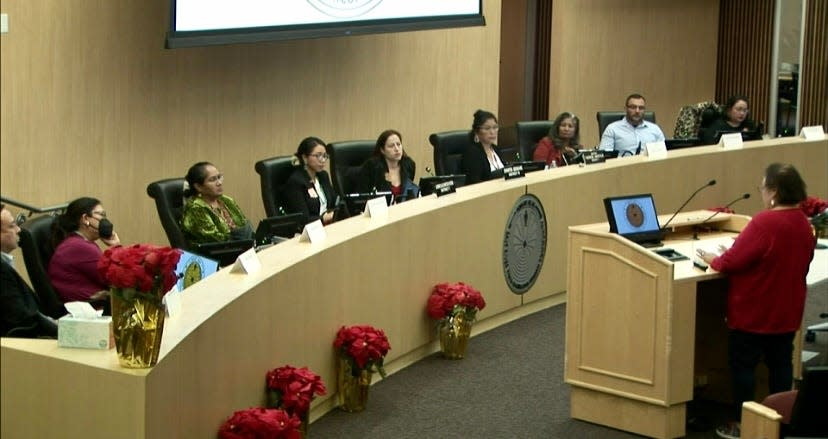Legislative proposal targets 'frightening' scam rehab centers that prey on Native people
- Oops!Something went wrong.Please try again later.
As federal law enforcement agents investigate fraudulent behavioral health centers in Arizona, state Sen. Theresa Hatathlie has introduced a measure that would strengthen the admission policies into behavioral health residential facilities and outline clearer guidelines throughout the process.
The bill is in response to the growing threat of pop-up rehab centers, which target vulnerable Indigenous populations, people who suffer from alcohol or substance abuse, who are unsheltered, or have some forms of mental health issues. Employees of the unregulated, unlicensed centers look for people who seem to be in need of immediate help, driving through metro Phoenix, towns close to the Navajo Nation, like Farmington and Gallup, and other tribal communities around the state.
The people are picked up, promised help at sober living centers or rehab centers, and taken to complete paperwork. But authorities say the centers, often housed in rental homes, are set up to take advantage of reimbursement from the Arizona Health Care Cost Containment System. The system's American Indian Health Program provides medically necessary services for enrolled members, including coverage for preventive and behavioral health care services.
More recent reports suggest the centers are now preying on entire families.

“I have a young lady who reached out to me herself, her family, her baby, her mother, her father is in a sober living environment,” said Hatathlie, D-Coal Mine Canyon. “But she is not allowed to divulge her address. There’s a little baby in that facility, and she reached out to me because she was running out of formula.”
She said the facility provides formula and food, but when the formula supply ran low, and the mother was told she had to make it last. Hatathlie is worried the baby will eventually become malnourished. Hatathlie said it's just one example of what victims have been going through when they find themselves in one of these centers. usually located in Phoenix and surrounding cities.
“I would appreciate some strategy to expedite these actions, investigations, inspections,” said Hatathlie. “This family has no history of alcoholism. No history of any type of drug abuse. They’re just there to have someone collect money off of them.”
Arizona Legislature:GOP lawmakers focus on prisons, drug use, police and people living on the street
Under Hatathlie's proposal, Senate Bill 1661, a behavioral health facility would be required to notify family members of patients admitted for an initiation evaluation, a step that would have to be documented. A person couldn't be taken to a center by a representative of the facility unless the person is sober or is referred by an approved provider of a tribal health care program.
Centers that fail to comply would be subject to fines: $750 for a first violation and $1,000 for a second violation. If there is a third violation, a 30-day license suspension will be imposed. Each day a violation occurs counts as a separate violation.
Encounters lead to missing persons reports
In October, the Ad Hoc Committee for Missing and Murdered Indigenous Peoples heard testimony on what has become a growing concern. Some encounters with scammers lead to situations that authorities say amount to human trafficking, and are increasingly occurring not only on the Navajo Nation but in other tribal communities across the state.
"There are current organizations that through the use of “tribal liaisons” collect individuals from a vulnerable population. Those individuals are then sold to businesses to populate outpatient treatment centers," said Gila River Indian Community Lt. Governor Monica Antone. "Those individuals are housed in unlicensed, unregulated rental homes that allow continued substance abuse and place Native Americans in dangerous conditions. A “call to action” stopping this abuse needs to occur immediately. Gila River members have been targeted along with other Indigenous peoples.”
In January, the Federal Bureau of Investigation began looking for victims who were recruited to live in and receive services from these centers since January 2020. FBI officials said the agency is still investigating these homes and couldn’t comment further.
But the spread of the centers has drawn new attention to missing persons reports. In October, the Albuquerque FBI Division reported 192 people on its missing persons list of Indigenous persons in New Mexico and the Navajo Nation. This latest list reflects the addition of 27 names and the removal of 18 since the previous list was released in September.
Maricopa County Sheriff's Office:Nearly 500 fentanyl pills found during Phoenix jail bookings
The Navajo Nation Police posted on social media that approximately 77 individuals in the Navajo Nation were missing, with some missing since the 1970s, including 28 females and 49 males. The posters would be distributed and displayed in all Navajo Police Department districts and periodically updated.
Hatathlie noted that the Department of Homeland Security is also involved, because some of the people involved are from other countries.
"Many of the victims are afraid to come forward simply because a lot of the scare tactics involved has to do with their family," said Hatathlie. "There's a lot of crime going on in these facilities. We've had individuals who have passed away in these facilities."

Law enforcement agencies find missing people at centers
The FBI said organizers are targeting Native Americans from the Navajo Nation and other communities in Arizona, New Mexico and South Dakota. Organizers frequent community gathering locations such as flea markets, trading posts and medical centers to pick up clients.
Targeted individuals are sometimes intoxicated or offered alcohol during transport. When they regain a functional state later, they have no idea where they are or how they got there, and they have difficulty finding a way home. The circumstances have led to a number of missing persons reports submitted to local law enforcement agencies, according to the FBI.
Although the FBI is investigating, a few police departments that surround the Navajo Nation are well aware of this issue. The Farmington Police Department, which is 30 miles from Shiprock, New Mexico, has been able to locate missing people who have gone to these treatment facilities on their own accord.
In an email response to The Arizona Republic, Farmington police said four tribal members were reported as missing. As detectives traveled to Arizona to work on a homicide lead for an unrelated case, they visited one treatment center and were able to locate one of the reported missing persons.
“The male advised he traveled to the treatment center of his own free will and was not coerced. He was removed from the National Crime Information Center (NCIC) and wished to stay on-site to receive further treatment,” Farmington police said. “The other three missing persons returned home from treatment facilities on their own accord. All three were contacted and advised they were not coerced into going. Since then, our detectives have cleared two additional cases, and in both instances, the missing people advised they were not coerced, and they were safe.”
In Tuba City there have been at least 60 of these types of cases reported. In Page, about 80 miles from Tuba City, police have heard reports that other jurisdictions apparently received regarding people being coerced into going to treatment centers. Page Police say they haven't heard of anyone being forced into vehicles but couldn't say it hasn’t happened or that it couldn’t happen in the future.
“Reports like this are concerning, must be responded to, and investigated immediately,” said Tim Lange, Page Chief of Police. “In Page, we have not identified an increase of missing Native individuals in our area. When we do receive a report of a missing person, we work closely with our law enforcement partners, including Navajo Police Department and the FBI, to locate these individuals. “
Alleged fentanyl trafficker:White supremacist found dead before Arizona drug trafficking trial
Lange said that in December, the police department received a report of women at a local business who were allegedly asking people if they had family or knew of anyone who needed substance abuse treatment.
“Our officers immediately responded to the business but did not contact anyone related to this call,” said Lange. “Nothing illegal was reported, but since the incident was suspicious, our officers told the local business to call the police department if the individuals returned so we could identify who they were. No subsequent request for assistance was ever made regarding this report.”
The San Juan County Sheriff’s Department in New Mexico said that agency had not heard of this issue and had no information to suggest it is occurring in its jurisdiction.
“However, due to our jurisdiction over crimes committed by and against Native vs. non-Native Americans, we do not patrol the Navajo Reservation (to include Shiprock) and rarely receive feedback from the Navajo Police Department on trends they are seeing,” said San Juan County Undersheriff Cordell Tanner.
In Gallup, a town where a lot of the alleged scammers are said to be focusing, police officials did not return email or call to comment.
Legitimate treatment centers worry about system abuse
Facilities in the legitimate business of assisting Indigenous people with health care, affordable housing and community development services have said the scam has been an issue for about two years now, since the start of the COVID-19 pandemic.
"We’ve been providing residential substance abuse treatment for 44 years," said Diana Yazzie Devine, president and CEO of Native American Connections. "This is our business. Residential substance abuse treatment, mental health treatment, keeping the family together in treatment — we take women with their children. Say a woman is really struggling, maybe her child might be taken away because there might be substance abuse, she can go into treatment with her child. We know this business.”
Native American Connections offers what it describes as integrated traditional ceremonies to those at their facilities, and Devine said they noticed individuals from the questionable facilities being dropped off, and not sure as to why they were there. She said sometimes these people would be sent to Native American Connection outpatient treatment and attempts to bill for their services would be denied because records showed they were from another residential program.
“We said ‘what is going on here?’” said Devine. “We’ve known about this for quite some time. It really has been a loophole that people have found from the American Indian Health Plan.”
She explained that when Native American Connections enrolls someone under the American Indian Health Plan, or provides services where they are billing Indian Health Services or their tribe, they are careful to get the person's tribal enrollment and Certificate of Indian Bloods. That’s not what is happening with the problematic centers. Instead, they are enrolling anyone and everyone.
“As long as someone says ‘yes, I want to be on AIHP,’ they’re enrolling them, whether they are native or not, or have documentation that they are enrolled tribal members,” she said. “We’ve been watching this ever since October 2019. It just got worse with COVID. But we have been aware of it early on.”
The American Indian Health Plan doesn’t require an authorization period, which makes it very easy to bill for services if providers don't have to get authorization. Because of the ongoing pandemic, there has been no licensing review or site visits or oversight, she said.
“The other health plans are businesses,” said Devine. “AIHP is a mechanism that the state Medicaid put together in all good intentions to make sure that Native American people can access state Medicaid. The loophole is anyone can enroll. We provide care based on current health plans. They are disenrolling some people from one health plan and enrolling them in AIHP, even if they are Native or not, because it's flexible, they pay higher, they don't have the preauthorization that you need, they can stay longer."
Another difference, Devine said, is that while Native American Connections serves a predominantly Native population, they serve anyone no matter who. She said flyers for the other programs specifically say a person has to be 'enrolled in AIHP only" and that is something her agency has never done.
“We don't ever pick anyone up,” said Devine. “We get a referral from the tribe. I’ve been here for 43 years; we don't drive around in vans and pick them up. It's terrible. It's totally the opposite of the model of care we have been providing for over 40 years. It's frightening. It's probably illegal and highly unethical.”
In a statement to The Republic, the Arizona Health Care Cost Containment System, which oversees the state's Medicaid program, said it takes concerns of fraud, waste, and abuse very seriously and actively investigates every claim that comes to its attention.
"While AHCCCS has no regulatory authority over sober living homes, we recognize that some members reside in them and may receive services from AHCCCS-enrolled outpatient providers," the statement said. "Of providers over which AHCCCS does have regulatory oversight, the agency has terminated 270 enrolled providers since January 2022 for various reasons, including exclusions, reported facility closures, fraudulent findings, and other matters related to the integrity of the Medicaid program."

Scams can bring in thousands of dollars
Navajo Nation first lady Jasmine Blackwater-Nygren, a former state lawmaker who was also a member of the House Ad Hoc Committee for Missing and Murdered Indigenous Peoples, testified in support of SB1661 this week, saying the bill will go a long way toward identifying facilities that are legitimate and those that run scams. She backed the claim that people are being taken to centers without consent, that they are at times inebriated when they're picked up, and that their families aren't notified of where their relatives are being taken.
"The people running the treatment facilities are making tribal members sign up for AHCCCS and taking money allocated from the federal government,” she said. “They keep them in the facilities by feeding them alcohol and drugs, to prevent them from leaving the sites so they can continue to receive the monthly payments.”
Hatathlie explained that one person can bring in more than $7,000 into these homes with the funding through AHCCCS or even through Medicare, depending on whether it is a sober living facility or residential behavioral health.
“However, if you incorporate certain strategies because behavioral health is actually a medical facility, that one individual can bring an excess of $20,000 in one month,” she said.
So far, 87 unlicensed facilities have been closed and 197 facilities have been inspected following meetings with the Arizona Attorney General's Office and Arizona Gov. Katie Hobbs, said Hatathlie.
Hobbs has been in close communication with leaders in the Native American community, some of whom have provided their own personal experiences of friends and family members who were victims to these types of scams, the governor's office said in an email to The Republic
"Governor Hobbs is aware and believes it is completely unacceptable," said the statement. "This is a devastating situation that is breaking families apart and causing irreparable harm to the victims and their loved ones. Right now, we are having the necessary conversations to understand what the main challenges are and finding ways to address and fight these problems head on."
Arlyssa Becenti covers Indigenous affairs for The Arizona Republic and azcentral. Send ideas and tips to arlyssa.becenti@arizonarepublic.com.
Support local journalism. Subscribe to azcentral.com today.
This article originally appeared on Arizona Republic: Drug rehab scam: Arizona lawmakers target deceitful treatment programs

